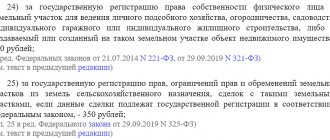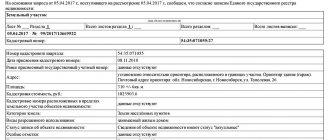Termination of land ownership is a procedure established by the legislator, associated with some difficulties and subtleties of proper registration.
The grounds for termination of ownership are the actual reasons that arise for the owner and interested parties. The list of grounds for carrying out this procedure is established by law. For reasons beyond the scope of this list, a person’s ownership of a land plot cannot be terminated. Also, citizens of the Russian Federation have the right to voluntarily give up their property in the prescribed manner.
Basic legal provisions
The process of land alienation is set out in detail in land and civil legislation. The right of citizens to acquire plots of land and dispose of them is established by the Constitution of the Russian Federation.
The main, fundamental law of Russia, the Constitution, contains the following information that directly relates to the rights of citizens to dispose of property:
- Every citizen of the Russian Federation can own a land plot as a property
- owners can use and dispose of their land within the framework of the rules established by law. In other words, the actions of the owner in relation to the land owned by him should not violate the rights and legitimate interests of third parties or the provisions of the law. Also, the use of land should not harm the environment
- the conditions and procedure for the use of plots are established by law
A strict hierarchy is established in the legislative system, therefore regulations adopted by the Russian Government should not conflict with the Constitution.
This principle forms the basis for the procedure for liquidating property rights to land plots. The basic rules of this procedure are contained in the Land Code:
- the property right to a land plot is terminated upon the specific expression of the will of the owner, executed in compliance with the procedure established by law
- ownership of land can be forcibly terminated if there are grounds established by law and through an approved procedure
- both methods of liquidating rights to land plots are set out in detail in the Civil and Land Codes, as well as the Federal Laws of the Russian Federation
- a citizen’s property right can be canceled regardless of how the land was acquired (through purchase and sale, privatization, inheritance or other similar methods)
In many situations, especially those related to the forced termination of land ownership, it is advisable for citizens to seek qualified legal assistance to more effectively protect their rights and interests.
Re-registration procedure
The procedure for re-registration of the right of use is regulated by Federal Law No. 137. According to the legislative act, the algorithm of action will be as follows:
- It is necessary to verify all land documents. Then find out whether the land plot is registered in the cadastral register and whether the right of use has been registered. If everything is done, then the user is specified in the registry.
- If the site is not registered, then its re-registration is impossible. You can clarify the information in the following ways:
- Search for data on the Public Cadastral Map.
- Contact Rosreestr. You can make a request electronically on the Rosreestr website (State Services section), or write a written application for the provision of an extract.
- Next, you need to draw up an application in which you indicate the request for re-registration of ownership. You can indicate the re-registration of the lease, but in this case the owner will not be able to dispose of the land without restrictions, because the owner will be the municipality.
- Submit the application and necessary papers to the authorized body that provided the land. In most cases, this body is the municipality, but there may also be state authorities.
- Wait for the decision to be received in one month.
- If a positive decision is received, then a purchase and sale agreement is concluded (if the land plot needs to be purchased) or a lease agreement (depending on what was initially specified in the request). If a house has already been built on the land and belongs to the applicant, then the authorized bodies will simply decide to transfer ownership rights free of charge.
- Contact Rosreestr to register property rights.
Grounds for termination of land rights
The grounds for termination of proprietary rights to land are mostly regulated by the Land Code. The basis itself is the reason, in the presence of which the owner of the plot is deprived of his rights to use, own or dispose of the property.
The grounds for termination of rights to land can be divided into two fairly broad groups:
- Voluntary termination of rights. This group includes the grounds on which a person voluntarily alienates his property. To carry out the procedure, a specific expression of the will of the citizen regarding the transfer of his property to another person is required. Such cases include the sale of land, transfer as a gift, or for rent. The legislation also establishes the possibility for citizens to voluntarily renounce property in favor of the state or third parties
- Forced liquidation of land rights. With such a procedure, the rights to a citizen’s property are terminated without taking into account his opinion. The grounds on which a person’s property rights are forcibly liquidated are established by land and civil legislation. The reasons and procedure for depriving a citizen of property should not conflict with the laws of the Russian Federation. The procedure for liquidating property rights is clearly regulated by the legislator
Failure to comply with the requirements of the legislation of the Russian Federation when liquidating property rights to land entails the invalidity of the procedure, regardless of who carried out it. If a person has compelling reasons, they can initiate legal proceedings and regain their rights to the plot.
Procedure for terminating ownership of land plots
In case of compensation
If the seizure is for a fee for municipal and state needs , the owner is warned three times that it is planned to relocate him from the occupied plot. The last notice contains an invitation to the local administration to draw up an agreement.
The owner should accept the invitation and try to make the most of useful options when determining the redemption value of the land plot or choosing a new plot. Here you need to take into account the cost of each element included in the cost of the land.
Such calculations should be carried out in advance , having approximately determined the purchase price of the site. A competent owner will not force things. Leaving his own calculations aside, he will consider the municipality's proposal. If this is more attractive than the real value of the land, you should not enter into a debate, but you should immediately formalize an agreement.
A proportionate redemption value, equal to the real one, provides for additional types of payment in the form of compensation for moving costs, etc. It is permissible to inform an authorized person about this.
If the actual cost is underestimated, you should write a notification to the administration, stating the reasons for the claims. If the issue is not resolved in favor of the owner within a month, you should go to court.
When free of charge
If the termination of property rights is gratuitous, the administrative body draws up an act of violation of the land, the surrounding landscape or established standards for the use of land. After drawing up the act, the violator is given a warning and a fine in accordance with the provisions of the Code of Administrative Offenses. An appropriate period is given to restore order.
The owner will need to immediately respond to the warning, since the administrative decision will be followed by an arbitration decision, which will deprive him of the land.
Guided by the provisions of the extract from the administrative act, you should begin to correct the violations. If there are several points, you need to eliminate first those that can be eliminated the fastest. Sometimes it is advisable to start by eliminating those violations that are “conspicuous”, that is, located on the surface. If it is possible to eliminate only part of the violations, when drawing up the next administrative act of inspecting the site and/or the territory adjacent to the site, the owner should indicate the changes made and justify the reason why he did not have time to complete the authorized activity.
If the municipality made an administrative decision unlawfully , within 10 days after receiving the decision, the owner can file an appeal to the district court.
Nuances of voluntary alienation of rights to a land plot
A citizen’s property rights are voluntarily annulled, as a rule, upon concluding any transaction. Such situations include the sale of property, donation, transfer by will. To formalize the alienation of a land plot for compensation or gratuitously, it is typical to draw up a written agreement and subsequent registration of the transfer of rights with the competent authority. Thus, voluntary alienation of land is carried out in two stages:
- Make a deal. The parties must agree on all essential terms of the transfer of property and record their rights through a written document. Participants in a transaction have the right to use notary services to certify the transaction. In some cases, notary support is mandatory
- Registration of transfer of ownership. Next, the agreement and the package of necessary documents are transferred by the parties to the Federal Registration Service or the Multifunctional Center, where information about the new owner is entered into the state register
State registration of a transaction is a mandatory procedure, without which legally significant consequences will not occur and ownership will not be transferred.
Land lease is also registered if the agreement is concluded for a period of more than 1 year. When leasing, the right to use a land plot is voluntarily transferred by a person to another party for a certain period.
When voluntarily transferring property rights to land, prohibitions on the alienation of certain categories of land should be taken into account. Thus, plots withdrawn from circulation cannot become the subject of civil legal relations.
When selling agricultural land, you should notify the administration of the locality, since state and municipal bodies have the right of priority to purchase such plots. This rule does not apply to plots provided for individual housing construction or the construction of a garage, as well as summer cottages or garden plots.
Emergence, change and termination of the basis for the use of land
The right to land arises on the following grounds (Article 8 of the Civil Code of the Russian Federation):
- purchase and sale agreement and other transactions that do not contradict the legislation of the Russian Federation;
- acts of government agencies that may serve as the basis for the emergence of property rights;
- decision of a judicial authority.
Changes to land legal relations can be made under the following circumstances:
- In the process of using the land. For example, after a natural disaster, if the conditions for using the land worsen, the tenant has the right to demand changes to the conditions previously agreed upon in the agreement.
- In case of partial withdrawal of land plots.
The grounds for termination of land legal relations are:
- Legal facts (for example, the death of the owner of the land plot, the end of the lease period, renunciation of the land on a voluntary basis).
- Sales agreement, decision on seizure for government needs.
- When the size of a land plot decreases, its use in a certain part ceases (depending on the decrease).
Land legal relations can change, arise and terminate on the basis of legal and illegal actions. If the owner of the land has repeatedly violated land legislation, he may be deprived of his rights to the land. The land plot may be seized by government agencies.
Nuances of forced termination of rights
A person’s ownership right to a plot of land may be liquidated without taking into account his opinion in the following cases:
- in case of improper use of the plot (such cases include idle land for three years or carrying out work that harms the properties of the land and the environment)
- buyout or seizure of land for the needs of the municipality or the state (this may be the need to lay power lines or locate other significant facilities)
- requisition (if urgent circumstances arise in order to ensure the safety of citizens or the state as a whole, a land plot may be confiscated from a person with return or subsequent compensation)
- seizure of land that, for reasons established by law, cannot belong to a citizen
- confiscation (seizure of property for the purpose of punishment for an offense and/or compensation for harm caused)
At the same time, land cannot be forcibly confiscated from citizens in cases that are not regulated by current legislation.
Property, including a plot of land, may be confiscated from a person if there are debt obligations that have not been fulfilled in order to pay off the debt. This procedure is carried out only through judicial proceedings.
How can it be terminated?
Voluntarily
In this case, the citizen needs to collect documents, including an application, and contact the local government authority. The applicant's right to land will be terminated on the day of registration of documents.
Unilaterally
Termination of the right can be carried out without the consent of the user, that is, forcibly. The Land Code regulates the following situations:
- Confiscation of land for the needs of the state or municipality.
- Inappropriate use of storage (misuse), if this leads to a violation of the environmental balance. This also includes damage to the territory, failure to comply with agronomic procedures, and more.
- When mandatory measures to improve land and protect soils are not carried out.
- In case of failure to fulfill obligations to bring the land into a condition suitable for use.
- Other situations provided for by the legislation of the Russian Federation.
Important: each situation must be supported by appropriate documentation.
Nuances of foreclosure
State or municipal bodies have the right to confiscate land from citizens with subsequent compensation in order to implement various programs for the placement of significant objects. The liquidation of a person’s rights is carried out through acts of federal laws or acts of constituent entities of the Russian Federation. At the same time, it is impossible to seize citizens’ land within the city for development.
The authorities are obliged to warn the owner of the plot one year before the seizure. The decision to hold such an event must be registered with Rosreestr. The owner retains his rights until the relevant court decision is made or the voluntary signing of a document on seizure with compensation.
A state or municipal body buys the land at market value, and the buildings on the site are also paid for. The amount received by the owner excludes expenses that he incurs for construction and other actions that contribute to an increase in market value and carried out after receiving notice of seizure.
When determining the market value of a site, it is necessary to contact specialists who perform an independent assessment. The owner has the right to disagree with the conditions provided by state or municipal authorities. In this case, the buying party initiates legal proceedings, during which the legality of the redemption and the sufficiency of the conditions offered to the owner are determined.
If you found this page useful, please recommend it to your friends:
Reasons
The right to permanent use of the land plot is terminated on the grounds indicated in the paragraph above.
In addition, it is worth noting that the following circumstances may serve as grounds for terminating the lease of a plot (Article 46 of the Land Code of the Russian Federation):
- The end of the lease agreement, if it was not renewed in a timely manner, was not extended (Article 621 of the Civil Code of the Russian Federation).
- At the initiative of the lessor on the grounds provided for forcibly terminating the right to use the lease.
- Refusal to fulfill the terms of the lease agreement by either party when the agreement is concluded for an indefinite period (Article 610 of the Civil Code of the Russian Federation).
- Termination of the contract ahead of schedule through a judicial authority at the request of one of the parties.
Our experts have prepared other publications about using memory, after reading which you will learn:
- What are the rules, terms and purposes for providing a site?
- What is unjust enrichment?
- Where to apply for land allocation and what to do if the administration refuses?
- What is the procedure for providing a loan?
- What is pre-approval?
- Who is entitled to benefits?
Procedure
At the legislative level, the rules are determined by which the termination of land use rights should be carried out.
So,
the algorithm of actions will be as follows:
- When carrying out supervision, authorized bodies must establish the fact of violation of the law in relation to land ownership.
- The owner of the land receives a notice of the need to urgently put the site in order and eliminate confirmed violations.
- If the owner does not put the memory in order in a timely manner and does not take any action, then he receives a notice of termination of rights to the memory.
- If the notice of termination of rights was ignored by the land owner, the administration forms a case and submits it to the judicial authority.
- The land plot is confiscated based on a court order.
The entire process may take about a month. The period depends on the specific case.
The procedure will require the following documents:
- the owner’s general passport, as well as his personal data;
- documents for land plots, including cadastral plan, description of boundaries, availability of communications;
- documents confirming the absence of debts on taxes and utility bills;
- documents evidencing the citizen’s right to use the memory;
- the commission’s conclusion on the condition of the site, including suitability for use, as well as on the rationality of use in specific periods.
Attention: all documents must be prepared in accordance with legal requirements. Copying and certification is also required.
Consequences of loss
- If a voluntary refusal of the land plot is made, the citizen is deprived of the right to operate the site. Consequently, all obligations cease (payment of taxes, utility costs, etc.) In this situation, no consequences occur.
- When land has been forcibly taken, the owner loses all his rights:
- construction of a house on a leasehold basis;
- sale of land;
- exploitation for the purpose of obtaining material gain, etc.
- If the seizure was due to the unsuitable condition of the site, then the owner must restore it to its original condition at his own expense.
Every landowner has the right to restoration. To do this, you should send a statement of claim to the court to challenge the decision to terminate the rights to use land. If a citizen proves that he is right by providing the relevant documents, he will return the authority to order the land plot back.
To summarize, we note that the restoration, modification and termination of rights to land plots is carried out on certain grounds provided by law.









